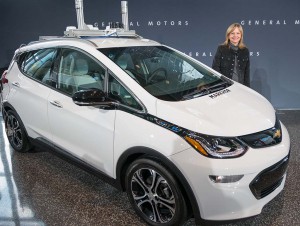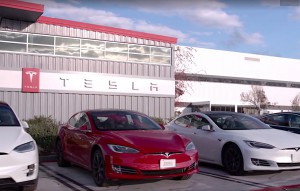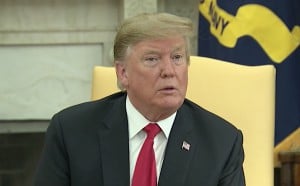
GM CEO Mary Barra is committed to electric vehicles and, along with the rest of the industry, been pushing for an extension of the federal EV tax credit.
One of the drivers of electric vehicle sales in the U.S. has been the $7,500 federal tax credit some buyers are eligible for when they buy a battery-electric vehicle; however, it appears a push to extend that credit will fall short.
Automakers, especially General Motors and Tesla Inc. have been trying to get federal lawmakers to extend or reinstate in the case of the aforementioned companies, the $7,500 credit. However, Reuters is reported that automakers and congressional aides do not expect the U.S. Congress will insert it into a year-end spending bill.
GM and Tesla have been pushing for more than a year for the credit to be extended beyond the current limit of 200,000 EVs sold per automaker because they have already sold more than that, GM with the Chevy Bolt and Tesla with its three-vehicle line-up of the Model S, X and 3.
(Finding a place to charge your EV continues to get easier)
The tax credit is aimed at defraying the cost of EVs that are more expensive than similarly sized internal combustion engine vehicles. Once the 200,000-unit mark is hit, the tax credit is phased out during a 12-month period, cut from $7,500 to $3,750 and then cut again to $1,875 and then finally zero.
The tax credit was effective last year, even though Tesla didn’t enjoy the full tax credit for most of the year with total U.S. EV sales came in at 361,307 for the year — up 81% compared with 2017. However, with the tax phased out for Tesla and down for GM, sales are up only slightly through the first three quarters of 2019 with sales of 236,067 EVs compared with 234,745 vehicles at this time last year.
The Driving America Forward Act raises the cap and allows purchasers of an additional 400,000 vehicles per manufacturer to be eligible for the tax credit. U.S. Sen. Debbie Stabenow, D-Mich., who co-authored a proposal to extend the credit, told Reuters the EV proposal is facing opposition from the White House, but she is still pushing for it.
(Americans now buying more EVs than cars with manual transmissions)
The bipartisan bill raises the cap by allowing purchasers of an additional 400,000 vehicles per manufacturer to be eligible for a $7,000 tax credit. Consumers can receive the full value of a $7,000 credit through the calendar quarter after the 600,000th vehicle is sold.
The value of the credit to consumers from this automaker then decreases to 50% before being phased out entirely after six months. The bill maintains the $7,500 tax credit for the first 200,000 units sold. It also extends the hydrogen fuel cell credit for ten years, through 2028.
It’s not just GM and Tesla expressing support for an extension, automakers across the board are throwing their support behind it. Given the substantial investments automakers are putting into EVs, it’s not a surprise. President Donald Trump has consistently said he was not in favor of the credits.
“This bill will help Ford grow our electrified vehicle portfolio, which includes iconic models our customers know and love,” said Joe Hinrichs, Ford’s President, Global Operations, in a statement.
(Senate may push $462B EV incentive plan if Democrats regain control)
“Ford is investing $11 billion in electrified vehicles through 2022. Expanding the existing framework gives our U.S. plants the ability to produce smarter, fuel-efficient vehicles for years to come. It also ensures that American manufacturers can stay competitive in this new automotive era.”



Did they really think the Republicans would extend it? To help out something that cuts into their oil money? Have to wait until the Democrats take control.